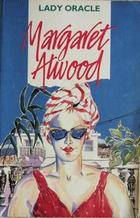Review: ‘Lady Oracle’ by Margaret Atwood
Author: Margaret Atwood
Published: Virago Press, 1990, pp. 345
Genre: General fiction
Blurb: From fat girl to thin, from red hair to mud brown, from London to Toronto, from Polish count to radical husband, from writer of romances to distinguished poet — Joan Foster is utterly confused by her life of multiple identities. She decides to escape to an Italian seaside resort to take stock of her life. But first, she must plan her death…
Where, when and why: The fact that I have absolutely no idea when or where I bought this book is a fairly good indication of quite how long it has languished on my shelves. I ended up reading this book after a weekend of picking up books, reading the first few pages, and then discarding them. I’m like a woman who has a whole wardrobe of clothes but complains she has nothing to wear: I have shelves of books but nothing to read. I kept trying my luck among my older books (some of which are so old, they almost merit their own bus pass) and eventually settled upon this book. It counts towards my Books Off the Shelf Challenge for 2010, details of which can be found by clicking the picture at the top of this post.
What I thought: If I were to say that this book was the humorous story of a girl who battles with her mother, her relationships and, most of all, her weight, you would probably dismiss it as fluffy chick lit, and that is certainly what it sounds like. However, nothing could be further from the truth; this book is a perfect example of how a novel can be so much more than its plot. Margaret Atwood incorporates all these aspects typical of chick lit in Lady Oracle and treats them in a way that is intelligent, engaging, and blackly comic .
It is impossible not to be drawn in to a novel which starts with the line:
I planned my death carefully; unlike my life, which meandered along from one thing to another, despite my feeble attempts to control it. (p. 7)
The narrator is fantastically unreliable. She spends the book developing so many different fictions of her own life to tell to people in order to disguise the truth that is is difficult to keep track of what is real and what isn’t, and furthermore I could never quite work out if what Jean is relating now is just another fiction, performing herself for yet another audience. This novel reflects, distorts and echoes itself through layers upon layers of deception. However, the pleasure of reading comes not from trying to find out the truth and outwit the narrator, but from becoming lost in the lies and so being made to examine the fragmentary nature of character. Unlike a lot of books which have an idea though, Lady Oracle also has an engaging story with fascinating characters, and so I was able to enjoy the thoughts that the book inspired without having the feeling of being cheated that I get when I read a book that that seems to have been written purely to convey that idea without any thought for plot.
It sounds a bit pompous, not to mention odd for a book which involves faking one’s own death, but there is a peculiar universality to the narration which speaks to the reader. My situation is very different from Jean’s (my mother is lovely, thank you very much; I somehow managed to completely avoid being bullied throughout my childhood; I have never been, nor intend to be, the mistress of a Polish count; and my future husband is not a manic depressive political activist) yet I found myself identifying with a lot of the things she said. My copy of the book is filled with little pieces of paper marking memorable quotes that I particularly liked. I’m sure I’m not the only person who can identify with Jean’s despairing observation:
That was the difference between us: for Arthur there were true paths, several of them perhaps, but only one at a time. For me there were no paths at all. Thickets, ditches, ponds, labyrinths, morasses, but no paths. (p.169)
These observations always have a wry, humorous tone to them which made the book a very good read. Jean’s imaginings of the home lives of important theorists and politicians, complete with peculiar hobbies and nagging wives, were particularly amusing. And anyone who has ever been to Italy will recognise the truth when she relates:
Driving in Italy made me nervous. People steered cars as if they were horses. They didn’t think in terms of roads but in terms of where they wanted to go: a road was where someone else wanted you to go, a road was an insult. I admired this attitude, as long as I wasn’t driving. (p. 132)
I could go on much longer with all the great quotations from this book, but you’d be far better reading it yourself. It really is worth the time.
Where this book goes: It’s a mark of how good this book is that I didn’t even need to finish it before I knew it would be going back on my shelves. I have three other unread Atwoods lurking on my shelves (one of which is also a bookshelf OAP) and enjoying Lady Oracle so much has inspired me to get some of those off the TBR pile sooner rather than later, so watch out for more Margaret Atwood books in the not-too-distant future.
Tea Talk: As the Polish count observes to Jean, Tea is the English remedy for everything. They are a strange people. (p. 146). I may perhaps be strange, but my love for tea is completely understandable when it is tea as delicious as Regent’s Park tea from Yumchaa, which has been filling my pot again these past few days. I’ll have to move on to something else soon or I’ll use it all up already.


Comment from TheBookGirl
Time August 27, 2010 at 2:47 pm
What a great review! I never would have known about this book, but now I definitely will look for it…You have a lovely blog and I wish you the best with it